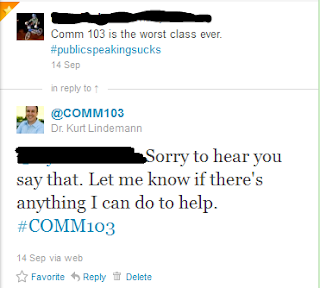Using Student Tweets to Illustrate Media Literacy Concepts
I've had a debate with some teacher friends on facebook as to whether I should take students to task for their tweets. I find it useful to use some examples of questionable tweets in class as a way of teaching media literacy. It helps me illustrate: 1) there's not such thing as "privacy" or "anonymity" on the web; 2) you need to mindful of multiple audiences with social media messages; and 3) you must be mindful of possible unintended messages when using social media.
Now, I never call out specific students, and I don't intend to put them "on blast," as the students like to say (and get no shortage of laughs hearing me say it in class). I should note that I make it clear on our BlackBoard site as well as on the syllabus that there is a class Twitter account. In most cases I use publicly accessible tweets (i.e., tweets that aren't locked and only available for followers, and tweets that can be found through a simple term search on twitter). In other cases, I use the tweets of students who chose to follow our COMM 103 class, thereby giving me access to their tweets. I use their tweets in class lectures in an attempt to teach students to be more mindful of the messages they send out into the amorphous universe of electronic media.
Why Not? Blurring Classroom Boundaries for Better or Worse
So, what's the debate? Well, some friends say that I shouldn't hold students accountable for what they say on twitter because, although I have a twitter account for class and many students choose to follow me, it's not really classroom communication. I disagree. The classroom is wherever students and teachers interact. Now, that may be an unfairly broad definition which may prompt the questions, "So, if you see a student at Target should you expect them to act like a student (e.g., respectful, polite)? And in turn, should you be expected to answer their questions about class at said Target store?"
These are good questions. And although social media has certainly blurred the boundaries of in-class and out-of-class, is it fair for me to (re)define those boundaries in a way convenient for me? I don't have an easy answer.
So, my response to tweets isn't necessarily one of chastising but usually silence (and somehow referencing it in class) or measured responses. Below are some examples.
Example One: Why do I need this class?
I talk in class about why, although some communication concepts may seem common sense, it's important to think about these concepts to be mindful of our communication habits and in which contexts those habits might or might not be appropriate.
Somehow, though, the concept of mindfulness didn't seem to resonate with this student:
 |
| These tweets are publicly accessible and easily found with a Twitter search of "communicate" |
Example Two: I don't need this class; in fact, I hate this class
The tweets below were decidedly more vitriolic:
 |
| These are publicly accessible with a simple search of COMM103 |
Example Three: I sound like I hate this class, but I'm actually just a little overwhelmed
Sometimes, I think students spew some tweets that don't actually mean what they might sound like to a teacher. Case in point, the below exchange, which began with a measured response to an "I hate this class" tweet (like my example above):
 |
| These are publicly accessible with a simple search of COMM103 |
 |
| The bottom tweet is the first one in the series |
Example Four: I actually like this class
There are many positive tweets as well. Below is one:
| Obviously, the #COMM103 hashtag, which I encourage students to use, makes this publicly accessible tweet easy to find |
What's It All For? The Future of Social Media in My Classroom
My use of the class Twitter account is a work in progress. But I think its utility and possibly lie in more than just communicating class information to students or answering questions (out of class or, as some instructor now use it, in class with a moderated live feed). Its use, and teachers' framing of its use, is rooted in the concepts of media literacy. We must be vigilant in illustrating to students the ways intention, audience, and tone play complex roles in social media.
Update
I was recently honored for the kind of experiments I detail above. You can read more about this on the SDSU News page.



